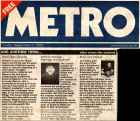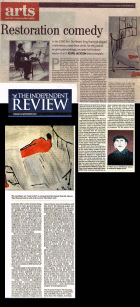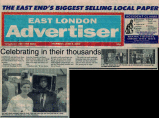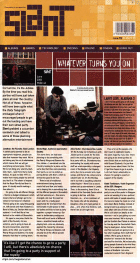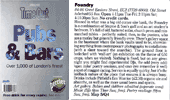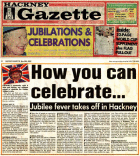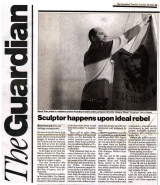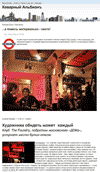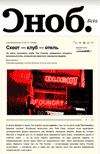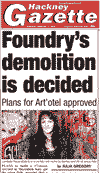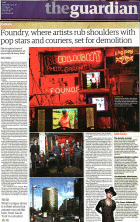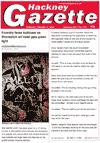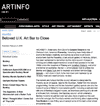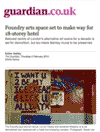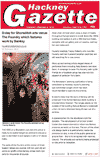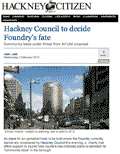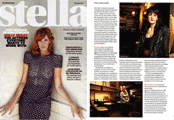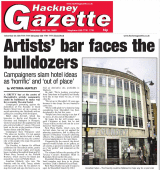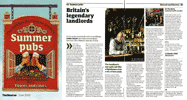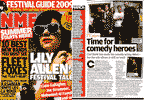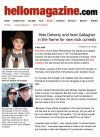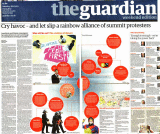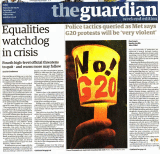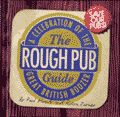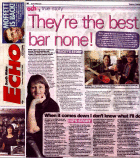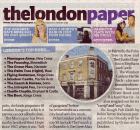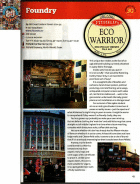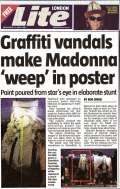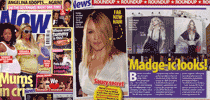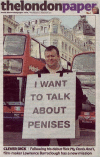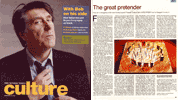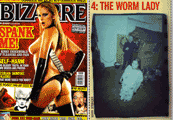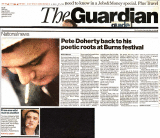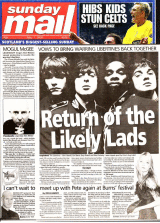[press - foundry]
[<<<] [>>>] click on image to enlarge
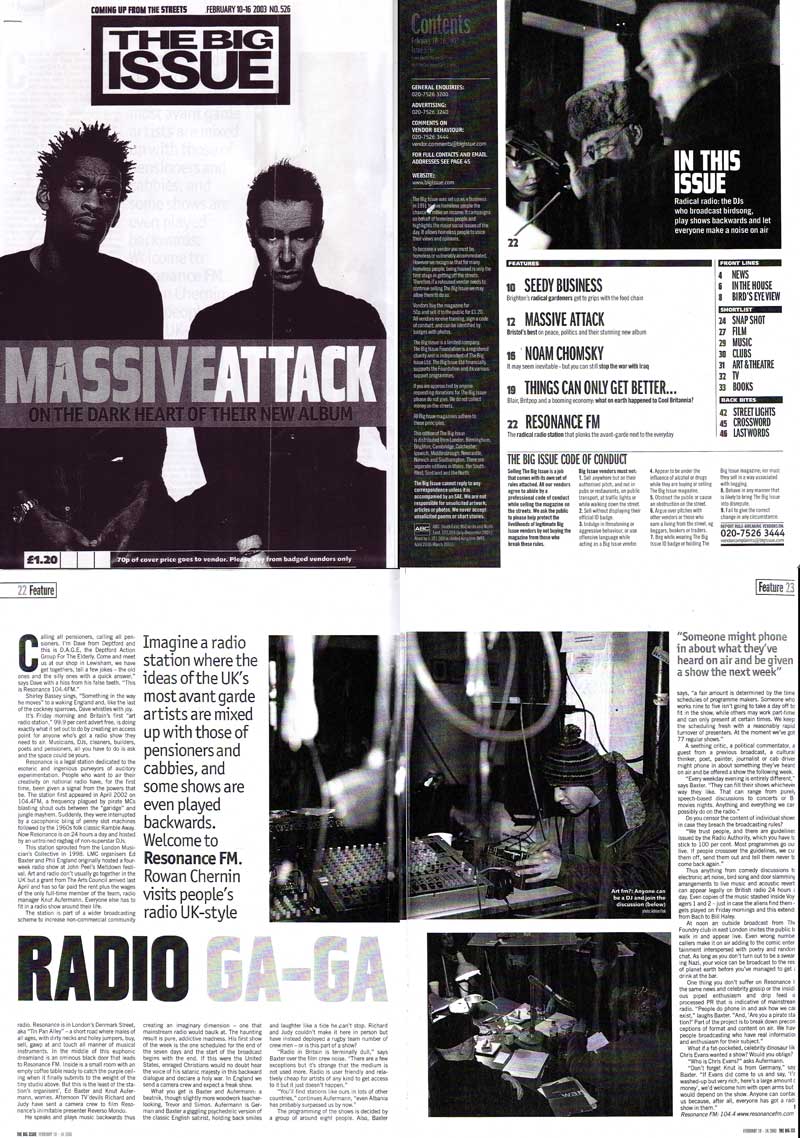
© tracey moberly 20030216.BigIssue_3.jpg
The Big Issue
The Foundry
RADIO GA-GA
RESONANCE FM: The radical radio station that plonks the avant-garde next to the everyday
10 February 2003
Imagine a radio station where the ideas of the UK's most avant garde artists are mixed up with those of pensioners and cabbies, and some shows are even played backwards. Welcome to Resonance FM. Rowan Chernin visits people's radio UK-style
Calling all pensioners, calling all pensioners. I'm Dave from Deptford and this is D.A.G.E, the Deptford Action Group For The Elderly. Come and meet us at our shop in Lewisham, we have get togethers, tell a few jokes - the old ones and the silly ones with a quick answer," says Dave with a hiss from his false teeth. "This is Resonance 104.4FM."
Shirley Bassey sings, "Something in the way he moves" to a waking England and, like the last of the cockney sparrows, Dave whistles with joy.
It's Friday morning and Britain's first "art radio station," 99.9 per cent advert free, is doing exactly what it set out to do by creating an access point for anyone who's got a radio show they need to air. Musicians, DJs, cleaners, builders, poets and pensioners, all you have to do is ask and the space could be yours.
Resonance is a legal station dedicated to the esoteric and ingenious purveyors of auditory experimentation. People who want to air their creativity on national radio have, for the first time, been given a signal from the 'powers that be. The station first appeared in April 2002 on 104.4FM, a frequency plagued by pirate MCs blasting shout outs between the "garidge" and jungle mayhem. Suddenly, they were interrupted by a cacophonic bling of penny slot machines followed by the 1960s folk classic Ramble Away. Now Resonance is on 24 hours a day and hosted by an untrained ragbag of non-superstar DJs.
This station sprouted from the London Musician's Collective in 1998. LMC organisers Ed Baxter and Phil England originally hosted a four week radio show at John Peel's Meltdown festival. Art and radio don't usually go together in the UK but a grant from The Arts Council arrived last April and has so far paid the rent plus the wages of the only full -time member of the team, radio manager Knut Aufermann. Everyone else has to fit in a radio show around their life.
The station is part of a wider broadcasting scheme to increase non-commercial community radio. Resonance is in London's Denmark Street, aka "Tin Pan Alley" - a short road where males of all ages, with dirty necks and holey jumpers, buy, sell, gawp at and touch all manner of musical instruments. In the middle of this euphonic dreamland is an ominous black door that leads to Resonance FM. Inside is a small room with an empty coffee table ready to catch the purple ceiling when it finally submits to the weight of the tiny studio above. But this is the least of the station's organisers', Ed Baxter and Knut Aufermann, worries. Afternoon TV devils Richard and Judy have sent a camera crew to film Resonance's inimitable presenter Reverso Mondo.
He speaks and plays music backwards thus creating an imaginary dimension - one that mainstream radio would baulk at. The haunting result is pure, addictive madness. His first show of the week is the one scheduled for the end of the seven days and the start of the broadcast begins with the end. If this were the United States, enraged Christians would no doubt hear the voice of his satanic majesty in this backward dialogue and declare a holy war. In England we send a camera crew and expect a freak show.
What you get is Baxter and Aufermann: a beatnik, though slightly more woodwork teacher-looking, Trevor and Simon. Aufermann is German and Baxter a giggling psychedelic version of the classic English satirist, holding back smiles and laughter like a tide he can't stop. Richard and Judy couldn't make it here in person but have instead deployed a rugby team number of crew men - or is this part of a show?
"Radio in Britain is terminally dull," says Baxter over the film crew noise. "There are a few exceptions but it's strange that the medium is not used more. Radio is user friendly and relatively cheap for artists of any kind to get access to it but it just doesn't happen."
"You'll find stations like ours in lots of other countries," continues Aufermann, "even Albania has probably surpassed us by now."
The programming of the shows is decided by a group of around eight people. Also, Baxter says, "a fair amount is determined by the time schedules of programme makers. Someone who works nine to five isn't going to take a day off to fit in the show, while others may work part-time and can only present at certain times. We keep the scheduling fresh with a reasonably rapid turnover of presenters. At the moment we've got 77 regular shows."
A seething critic, a political commentator, a guest from a previous broadcast, a cultural thinker, poet, painter, journalist or cab driver might phone in about something they've heard on air and be offered a show the following week.
"Every weekday evening is entirely different," says Baxter. "They can fill their shows whichever way they like. That can range from pure speech-based discussions to concerts or B-movies nights. Anything and everything we can possibly do on the radio."
Do you censor the content of individual shows in case they breach the broadcasting rules?
"We trust people, and there are guidelines issued by the Radio Authority, which you have to stick to 100 per cent. Most programmes go out live. If people crossover the guidelines, we cull them off, send them out and tell them never to come back again."
Thus anything from comedy discussions to electronic art noise, bird song and door slamming arrangements to live music and acoustic reverb can appear legally on British radio 24 hours a day. Even copies of the music stashed inside Voyagers 1 and 2 - just in case the aliens find them - gets played on Friday mornings and this extends from Bach to Bill Haley.
At noon an outside broadcast from The Foundry club in east London invites the public to walk in and appear live. Even wrong number callers make it on air adding to the comic entertainment interspersed with poetry and random chat. As long as you don't turn out to be a swearing Nazi, your voice can be broadcast to the rest of planet earth before you've managed to get a drink at the bar.
One thing you don't suffer on Resonance is the same news and celebrity gossip or the insidious piped enthusiasm and drip feed of processed PR that is indicative of mainstrean radio. "People do phone in and ask how we can exist," laughs Baxter. "And, 'Are you a pirate station?' Part of the project is to break down preconceptions of format and content on air. We have people broadcasting who have real information and enthusiasm for their subject."
What if a fat-pocketed, celebrity dinosaur like Chris Evans wanted a show? Would you oblige?
"Who is Chris Evans?" asks Aufermann.
"Don't forget Knut is from Germany," says Baxter. "If Evans did come to us and say, 'I'm washed-up but very rich, here's a large amount of money', we'd welcome him with open arms but would depend on the show. Anyone can contact us because, after all, everyone has got a radio show in them."
Resonance FM: 104.4 www.resonancefm.com
